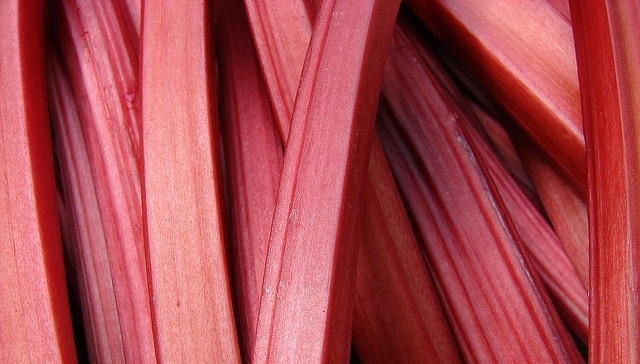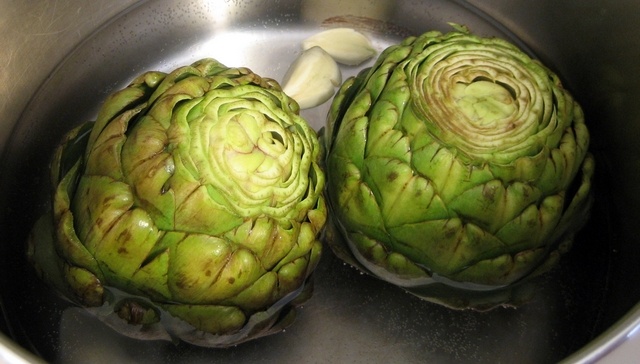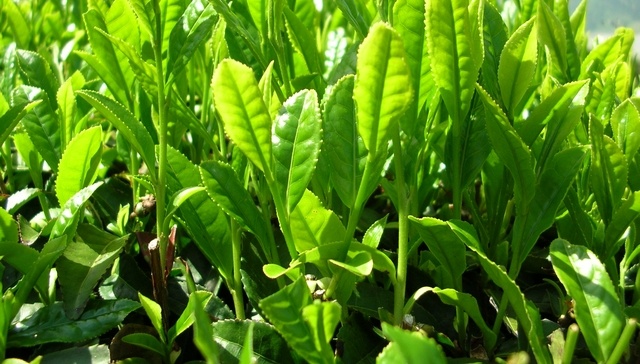1. Rhubarb
If lower cholesterol is your goal, rhubarb is a dietary choice you can make on a daily basis. This green, leafy, long-stalked veggie has been studied by the National Institute of Health and found to be beneficial. How’s that for an endorsement? The study results showed that while the bad cholesterol levels (LDL) were reduced by 9 percent and total cholesterol dropped by 8 percent, the good cholesterol levels were unchanged. Recommended quantity of rhubarb stalk is 27 grams a day for the maximum benefit. But be warned that the leaves of the rhubarb plant should not be eaten either cooked or raw, as they contain a toxic chemical. Eat healthy, stay smart.
2. Artichoke
Preventing cholesterol from being produced in the body is one of the advantages of the artichoke leaf extract, which can be obtained by eating a properly prepared artichoke. Like rhubarb, it reduces both total cholesterol and bad cholesterol levels. What’s interesting about this herbal alternative is that prescription drugs called statins used to treat high cholesterol contain ingredients that have the same enzyme inhibitor. One study resulted in feedback from patients who were taking anti-cholesterol prescription drugs that the effects of taking artichoke leaf extract were equal to or better than their medication. Do it naturally so you don’t have to do it by prescription.
3. Oat Bran
Prevention is always better than cure, and the benefit of oat bran is that it prevents absorption of cholesterol into the bloodstream. If you are a fan of oat bran, two-thirds of a cup per day may give you the amount your body needs to make an impact on your total cholesterol levels. Beta-glucan (soluble fiber) is one of the key components in oat bran. Each gram you take in may reduce your bad cholesterol level by about 1 percent. Keep in mind this is just for comparison purposes, as 100 g of oat bran will provide about 15 grams of soluble fiber. It should be mentioned that there are certain gastrointestinal side effects that go with overeating oats.
4. Garlic
Garlic has long been known to clean the blood and prevent plaque buildup in the arteries, which lowers the risk of cardiovascular problems. It also has been proven to have a cholesterol-lowering effect in its unprocessed state, so using garlic in cooking brings about the same benefits as taking garlic pills or capsules. The added benefit to using it in your meals is there are no side effects to worry about. The effects garlic has in lowering cholesterol levels is generally thought to be temporary. So make it a daily or every-other-day ingredient in your home cooking to achieve its greatest effect. A daily intake of 500 to 1000 mg of garlic is recommended, but pay attention to any side effects that consuming too much garlic may have. Remember, moderation in all things.
5. Green Tea
Studies show that green tea has a multitude of health benefits for everyone. Like artichoke and rhubarb, it lowers bad cholesterol levels, but green tea actually increases the good cholesterol levels. A double benefit that attacks the problem from two fronts. The reason green tea has a better health reputation than regular tea is that there is no processing of green tea leaves; they are simply dried out and steamed. The result of this is an antioxidant, ECGC, is retained in higher concentrations and maximizes the benefit to your body. That’s why green tea has such a positive effect on preventing cancer and many other health conditions. Going green can be internal as well as environmental.




